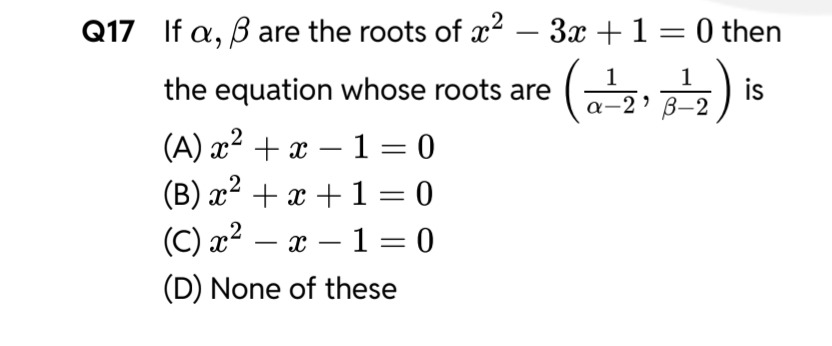Question
Question: If $\alpha, \beta$ are the roots of $x^2-3x+1=0$ then the equation whose roots are $\left(\frac{1}{\...
If α,β are the roots of x2−3x+1=0 then the equation whose roots are (α−21,β−21) is

x2+x−1=0
x2+x+1=0
x2−x−1=0
None of these
x^2-x-1=0
Solution
Let's find the quadratic equation whose roots are related to the roots of the given quadratic equation.
Given equation: x2−3x+1=0 Let its roots be α and β.
From Vieta's formulas for the given equation: Sum of roots: α+β=−(coefficient of x)/(coefficient of x2)=−(−3)/1=3 Product of roots: αβ=(constant term)/(coefficient of x2)=1/1=1
The new roots are y1=α−21 and y2=β−21. Let the new quadratic equation be y2−(Sum of new roots)y+(Product of new roots)=0.
Method 1: Using Sum and Product of New Roots
-
Calculate the sum of the new roots (S′): S′=y1+y2=α−21+β−21 To add these fractions, find a common denominator: S′=(α−2)(β−2)(β−2)+(α−2) S′=αβ−2α−2β+4α+β−4 S′=αβ−2(α+β)+4α+β−4
Now substitute the values α+β=3 and αβ=1: S′=1−2(3)+43−4 S′=1−6+4−1 S′=−1−1 S′=1
-
Calculate the product of the new roots (P′): P′=y1y2=(α−21)(β−21) P′=(α−2)(β−2)1 P′=αβ−2α−2β+41 P′=αβ−2(α+β)+41
Now substitute the values α+β=3 and αβ=1: P′=1−2(3)+41 P′=1−6+41 P′=−11 P′=−1
-
Form the new quadratic equation: The new equation is y2−S′y+P′=0. Substitute S′=1 and P′=−1: y2−(1)y+(−1)=0 y2−y−1=0
Method 2: Using Transformation of Roots
Let y be a root of the new equation. The relationship between the old root x (which can be α or β) and the new root y is given by: y=x−21
We need to express x in terms of y: y(x−2)=1 yx−2y=1 yx=1+2y x=y1+2y
Now substitute this expression for x into the original equation x2−3x+1=0: (y1+2y)2−3(y1+2y)+1=0
To eliminate the denominators, multiply the entire equation by y2: (1+2y)2−3y(1+2y)+1⋅y2=0
Expand and simplify: (1+4y+4y2)−(3y+6y2)+y2=0 1+4y+4y2−3y−6y2+y2=0
Combine like terms: (4y2−6y2+y2)+(4y−3y)+1=0 (5y2−6y2)+y+1=0 −y2+y+1=0
Multiply by −1 to make the leading coefficient positive: y2−y−1=0
Both methods yield the same result.
Therefore, the correct option is (C) x2−x−1=0.
